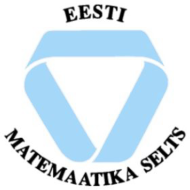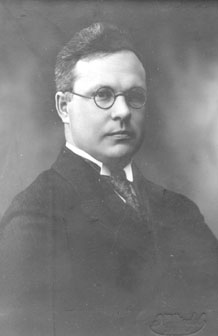Estonian Mathematical Society
Eesti Matemaatika Selts | |
 | |
| Abbreviation | EMS |
|---|---|
| Predecessor | Academic Mathematical Society |
| Formation | 23 February 1926 |
| Type | Mathematical society |
| Headquarters | Tartu |
| Location | |
President | Jüri Lember |
| Award(s) | Arnold Humal Prize |
| Website | matemaatika |
The Estonian Mathematical Society (Estonian: Eesti Matemaatika Selts, EMS) is a mathematical society founded in Estonia in February 1926. The EMS is based in Tartu, and is a founding member of the European Mathematical Society.[1][2] It is recognised by the International Mathematical Union.[3]
History

The predecessor of the Estonian Mathematical Society was the Academic Mathematical Society (Estonian: Akadeemiline Matemaatika Selts), which was founded in Tartu on 23 February 1926.[1]
In 1940 Estonia was annexed by the Soviet Union and became the Estonian SSR.[4] The Academic Mathematical Society was forced to cease its activities, and had its last meeting in November 1940.[1] Hans Kruus, who was at the time rector of the University of Tartu, recommended that the society be dissolved, but this was prevented from happening when Operation Barbarossa (and the subsequent occupation of Estonia by the Nazis) shifted the priorities of the Soviet Union.[1] Society president Hermann Jaakson repeatedly tried to restart the activities of the society during the war, but was unsuccessful.[1]
When the Second World War ended scientific societies continued to be banned in Estonia.[1] An attempt to restart the society in 1983 was rejected by the Communist Party of Estonia.[1] In 1987 the Soviet Union introduced perestroika, which allowed for more political independence. On 17 September 1987 the Academic Mathematical Society held its re-opening conference, and its name was changed to the Estonian Mathematical Society.[1]
In April 1988 a Computer Science branch of the EMS was established. It was disbanded in 1993 following the formation of the Estonian Society of Informatics.[5]
Awards
Arnold Humal Prize
The Estonian Mathematical Society annually awards the Arnold Humal Prize to an Estonian mathematician under the age of 30. Because Arnold Humal obtained his PhD at the age of 26, the prize decides between equal candidates in favour of the younger.[6] Past winners of the prize are:[6]
- 2007 – Kristel Mikkor
- 2009 – Helle Visk
- 2010 – Evely Leetma
- 2011 – Daria Gordon
- 2012 – Indrek Zolk
- 2013 – Aleksei Lissitsin
- 2014 – Erge Ideon
- 2016 – Johann Langemets
- 2017 – Silja Veidenberg
- 2019 – Ülo Reimaa
- 2021 – Rihhard Nadel
- 2023 – Kristo Väljako and Andre Ostrak
Other awards
The EMS Publication Award (Estonian: EMS Publikatsiooniauhind) is awarded to a young mathematician with a connection to Estonia for a publication in an international mathematical journal.[7]
The Professor Gerhard Rägo Memorial Medal has since 1990 been awarded for improving the teaching of mathematics in Estonian schools.[8]
The Student Prize of the EMS (Estonian: Eesti Matemaatika Seltsi üliõpilaspreemia) is a scholarship awarded annually to recognise "meaningful results obtained by students in their undergraduate studies in mathematics and applications of mathematics."[9]
The Olaf Prinitsa Prize recognises a student who has obtained a master's degree in mathematics education.[10]
Presidents
Past presidents of the Estonian Mathematical Society are: [1]
- Gerhard Rägo (1926–1927)
- Jüri Nuut (1927–1932)
- Edgar Krahn (1932–1936)
- Hermann Jaakson (1936–1940)
- Ülo Lumiste (1987–1993)
- Mati Abel (1994–2003)[11]
- Kalle Kaarli (2003–2009)[12][13]
- Raul Kangro (elected 2009)[14]
- Valdis Laan (2015–2018)[15][16]
- Rainis Haller (2018−2022)[17][18]
- Jüri Lember (2021–present)[19][20]
See also
References
- ^ a b c d e f g h i Mati Abel (September 2001), "75 Years of the Estonian Mathematical Society", Newsletter of the European Mathematical Society (41), European Mathematical Society: 18–19, ISSN 1027-488X, retrieved 2024-08-24
- ^ "Full members of the EMS", European Mathematical Society, retrieved 2024-08-20
- ^ "Members: Estonia", International Mathematical Union, retrieved 2024-08-20
- ^ Lauri Mälksoo (2003). Illegal Annexation and State Continuity: The Case of the Incorporation of the Baltic States by the USSR. Leiden – Boston: Brill. ISBN 90-411-2177-3.
- ^ "Matemaatikaseltsi tegevus Eestis läbi aegade" [Activities of the Estonian Mathematical Society through the ages], Estonian Mathematical Society (in Estonian), retrieved 2024-08-24
- ^ a b "A. Humala preemia" [A. Humala prize], Estonian Mathematical Society (in Estonian), retrieved 2024-08-24
- ^ "EMS Publikatsiooniauhind" [EMS Publication Award], Estonian Mathematical Society (in Estonian), retrieved 2024-08-24
- ^ "Professor Gerhard Rägo nimeline mälestusmedal" [Professor Gerhard Rägo Memorial Medal], Estonian Mathematical Society (in Estonian), retrieved 2024-08-24
- ^ Eesti Matemaatika Seltsi üliõpilaspreemia [Student prize of the EMS] (in Estonian), retrieved 2024-08-24
- ^ "Olaf Prinitsa nimeline preemia" [Olaf Prinitsa prize], Estonian Mathematical Society (in Estonian), retrieved 2024-08-24
- ^ "Mati Abel – 75", Universitas Tartuensis (in Estonian), retrieved 2024-08-24
- ^ "EMS 2002/2003 tegevused" (PDF), Aastaraamat 2002-2003 [Yearbook 2002-2003] (in Estonian), p. 178, retrieved 2024-08-24
- ^ "Kalle Kaarli Curriculum Vitae", Estonian Research Information System, retrieved 2024-08-24
- ^ "EMSi üritused" (PDF), Aastaraamat 2009 [Yearbook 2009] (in Estonian), p. 315, retrieved 2024-08-24
- ^ "Eesti Matemaatika Seltsi üritused" (PDF), Aastaraamat 2013-2016 [Yearbook 2013-2016] (in Estonian), p. 303, retrieved 2024-08-24
- ^ "Valdis Laan Curriculum Vitae", Estonian Research Information System, retrieved 2024-08-24
- ^ "Eesti Matemaatika Seltsi tegevusest 2018. a" (PDF), Aastaraamat 2018 [Yearbook 2018] (in Estonian), p. 163, retrieved 2024-08-24
- ^ "Rainis Haller Curriculum Vitae", Estonian Research Information System, retrieved 2024-08-24
- ^ "Lühiinfo seltsi kohta" [Brief information about the society], Estonian Mathematical Society (in Estonian), retrieved 2024-08-24
- ^ "Jüri Lember Curriculum Vitae", Estonian Research Information System, retrieved 2024-08-24
